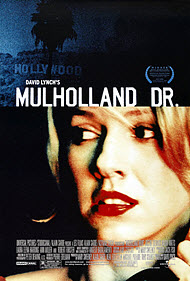Mulholland Drive
 for explicit sexuality, nudity, violence and disturbing content.
for explicit sexuality, nudity, violence and disturbing content.
Reviewed by: Dr. Kenneth R. Morefield
| Moral Rating: | Extremely Offensive |
| Moviemaking Quality: |
|
| Primary Audience: | Adults |
| Genre: | Drama / Thriller |
| Length: | 2 hr. 27 min. |
| Year of Release: | 2001 |
| USA Release: |
| Featuring |
|---|
| Naomi Watts, Laura Harring, Ann Miller, Justin Theroux, Robert Forster |
| Director |
|
David Lynch |
| Producer |
| Mary Sweeney, Alain Sarde, Neal Edelstein, Michael Polaire, Tony Krantz |
| Distributor |
A woman (Laura Harring as Rita) narrowly escapes getting murdered but is left with a head injury that gives her amnesia. When she is discovered by a young aspiring actress (Naomi Watts as Betty), the two try to unravel the mystery of her identity.
“Mulholland Drive,” like most of David Lynch’s films, has polarized its viewers. It is one of those films that its admirers will call “expressionistic” or “surreal” and its detractors will call “incoherent” or “indecipherable.” So which is it? A survey of film critics (www.rottentomatoes.com) indicates that positive reviews are outnumbering negative ones 4-1. But a closer look indicates that even most of the positive reviews concede that the film is impossible to interpret lucidly with any degree of certainty. “Mulholland Drive” is one of those films in which people fall asleep and maybe the next scene is a dream—or maybe it’s not. Then three scenes later another character will wake up and the film will suggest that the last scene was a dream—or maybe it is still the first character dreaming of a person dreaming about her. You get the idea.
 Like the more accessible (but no better) “Vanilla Sky”, “Mulholland Drive” questions the reality of every scene by keeping a consistent tone between fantasy and reality and changing perspective often. By calling into question what you’ve already seen as well as what you are about to see, the film consciously refuses to give you an anchor by validating any single scene as a starting point for unraveling what is real. Some people will enjoy the challenge of creating meaning out of a jumble of images, others will like the freedom to make it be whatever they decide. The absence of any definitive meaning does mean that nobody’s interpretation can be called wrong, and that fact is a powerful aphrodisiac to make less secure critics fall in love with the film. For me, however, “Mulholland Drive” fails to answer the questions of relevance. If anything is (or can be) unreal, how can I care about what I’m seeing? I can care about someone’s dream, but only if I first care about that someone. If there is no correct answer, why should I care about the question?
Like the more accessible (but no better) “Vanilla Sky”, “Mulholland Drive” questions the reality of every scene by keeping a consistent tone between fantasy and reality and changing perspective often. By calling into question what you’ve already seen as well as what you are about to see, the film consciously refuses to give you an anchor by validating any single scene as a starting point for unraveling what is real. Some people will enjoy the challenge of creating meaning out of a jumble of images, others will like the freedom to make it be whatever they decide. The absence of any definitive meaning does mean that nobody’s interpretation can be called wrong, and that fact is a powerful aphrodisiac to make less secure critics fall in love with the film. For me, however, “Mulholland Drive” fails to answer the questions of relevance. If anything is (or can be) unreal, how can I care about what I’m seeing? I can care about someone’s dream, but only if I first care about that someone. If there is no correct answer, why should I care about the question?

I haven’t said anything about content yet. There are some frank depictions of sexuality which are more disturbing than prurient. Unlike an “Eyes Wide Shut,” which created a disturbing mood by exploring difficult questions regarding its subject matter, “Mulholland Drive” seems to go the route of creating a disturbing mood by simply throwing disturbing content up on the screen. I’m usually willing to subject myself to difficult material, but I like there to be some payoff for doing so—an insight or truth revealed or learned as a result of doing the work of thinking about some difficult ideas. This isn’t an idea movie, though; like “Moulin Rouge,” it is primarily about style over substance. The film does look terrific, and Lynch does succeed at creating a growing feeling of entrapment. Naomi Watts is fabulous in a difficult role. But in the end it plays a little too much like Lynch emptied his common-place book of its scenes and ideas without bothering to create a context that would make his striking style truly powerful in an emotional or artistic way.
The story behind “Mulholland Drive”—that it was originally commissioned as a television pilot which was rejected by ABC—is well known. In an interview with Salon.com, Lynch said that he was attracted to the idea of the “ongoing” story. What the movie demonstrates, though, is what any “X-Files” fan could tell you: it is easier to open threads than resolve them or tie them together. There is a difference between a viewer not knowing where the story is going and a viewer becoming convinced that the author/artists doesn’t know where he is going with it. While audiences will initially respond favorably to complex ideas or multiple storylines, at some point, if enough unresolvable loose ends accumulate, they may become convinced that the story will have no resolution and refuse to invest anything in it emotionally. That was certainly the case for me with this film. Ultimately there will be two reactions, I think. There will be those who are totally lost but intimidated by the power of Lynch’s images and the applause surrounding his reputation. They will nod their head knowingly at the end and talk about how “deep” the film is, but when asked anything specific will likely tell you, “If you don’t get it, I couldn’t explain it to you.” Then there will be those who say the emperor has no clothes. I’m somewhere in the middle, but much closer to the latter than the former.
“Your old men will dream dreams, your young men will see visions” (Joel 2:28b)
My Grade: D


[Very Offensive / 4]
Don’t dismiss the film by saying “It doesn’t make sense.” It does. You just have to think about it. Discussion also helps. I would say that Mulholland Drive is not only one of the best films of 2001, but one of the best films in at least the past five years. If you are sick of the usual Hollywood fare and want something that will actually make [you think, then this is it.]
[Very Offensive / 5]



My Ratings: [5]